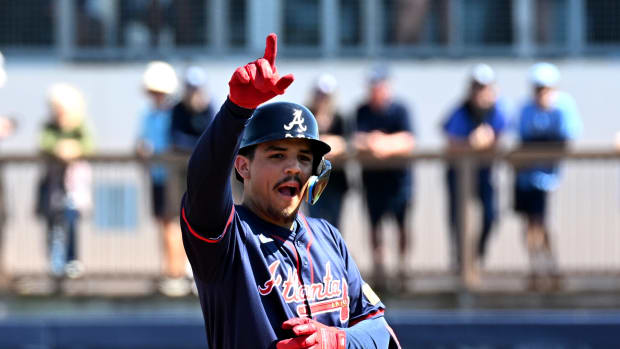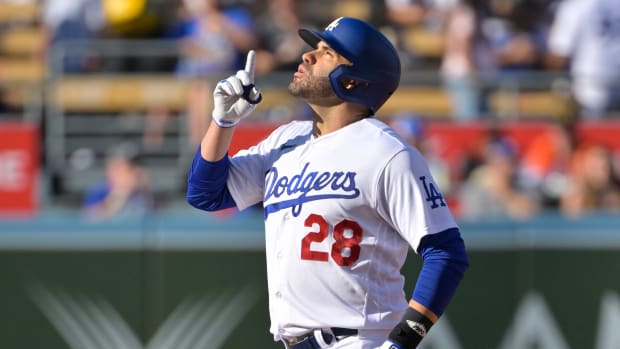Breaking down the 2017 NCAA baseball tournament bracket
Last year’s NCAA baseball tournament was a case study in unpredictability, as Coastal Carolina toppled several titans of the sport on its way to a national title. But after an early exit in their conference tournament, the Chanticleers were on the outside looking in on Monday when the 2017 bracket was released, which only sets the tone for another month of upheaval and intrigue as 64 teams vie for the chance to dogpile in Omaha as national champions.
The road to the College World Series begins with a magnificent first weekend: 16 four-team, double-elimination regionals at sites around the country, with the winners advancing to eight best-of-three Super Regionals for the chance to go to Omaha. The action starts Thursday afternoon (more on that later) and runs virtually non-stop until Monday afternoon—and that’s before taking into account any of the widespread weather delays that plagued last year’s tournament.
Below, five early impressions of this year’s field of 64:
1. Oregon State’s road to Omaha is mostly manageable. Mostly: For all the drama of the selection show, the No. 1 national seed was hardly a surprise. Oregon State went 49–4 in the regular season and has been the consensus top-ranked team since March on the strength of its pitching staff, which led the nation with a team ERA of 1.84. (For context as to just how ridiculous that is, Illinois-Chicago ranked second in Division I with a 2.57 staff ERA, and Louisville is the only other team even within a run of the Beavers’ mark.) Ace lefthander Luke Heimlich posted an absurd 0.81 ERA in 16 starts and finished ninth in the country with 120 strikeouts. After Heimlich comes righthander Jake Thompson, who averaged just under a strikeout per inning and didn’t lose a start in the regular season.
The Beavers won 23 straight games earlier this season, started the season 28–1 and are working on a 16-game winning streak heading into tournament play. It’s hard to imagine Nebraska, Yale or first-round opponent Holy Cross preventing Oregon State from cruising through its regional. However, the Beavers will have to earn their spot in Omaha on the tournament’s second weekend, when they could host 2014 champion Vanderbilt, a St. John’s team that finished top-10 nationally in both ERA and batting average or Clemson, who started the year 25–5 before limping into one of the final regional host slots.
2. Heartbreak in Coral Gables and Columbia: Two of the powerhouse programs left out of the field made valiant late runs to make the committee’s decisions tougher but ultimately couldn’t overcome their shaky regular seasons. Miami missed the field of 64 for the first time in 45 years, running out of gas in the ACC Tournament semifinals against North Carolina when a win over the No. 2-ranked Tar Heels could have kept their spot in the bracket safe from bid-stealers from smaller conferences like Rice and BYU.
Oregon State, UNC are top 2 seeds in NCAA baseball tourney; Miami's streak ends
South Carolina, which opened the decade with back-to-back national titles, has now missed two of the past three tournaments under head coach Chad Holbrook. The Gamecocks hadn’t won a series in conference play since the beginning of April, but they used a home run barrage to reach the semifinals of the SEC Tournament as the 11-seed, only to leave their fate in the hands of the committee with a shutout loss to LSU.
3. Regional of Death candidates: Strap in for some fun baseball at the Hattiesburg Regional, where Conference-USA regular season champ Southern Miss hosts a loaded four-team field that includes Mississippi State, South Alabama and Illinois-Chicago. Mississippi State’s Brent Rooker hit 21 home runs in the regular season, tied for fifth nationally. South Alabama tallied mid-week wins against Mississippi State, LSU and Auburn before claiming the school’s first Sun Belt title since 2005—plus, the Jaguars eliminated Southern Miss from the tournament last year. Even UIC won a road series at Vanderbilt on its way to a Horizon League title.
A trip to Baton Rouge is the likely reward for the team that emerges from the weekend’s action at Pete Taylor Park. Barring a stunning upset, SEC champion and No. 4 national seed LSU will be waiting in the Super Regionals.
Two regionals deserve honorable mention: Houston hosts two other dangerous in-state foes in Texas A&M and Baylor, with Big Ten tournament champion Iowa rounding out that foursome. Florida State also has its work cut out to hold serve in the Tallahassee Regional with a first-round matchup against a high-octane four-seed in Tennessee Tech, which led the nation with 97 home runs. The other side of that bracket contains a pair of at-large invitees in Auburn and UCF who can beat anyone in the country at their best.
4. MLB draft watch: The 2017 MLB draft runs June 12–14, just as the College World Series field takes shape, but fans turning on college baseball for the first time this year can get a good early look at several top prospects on the tournament’s opening weekend.
Miami baseball record postseason streak snapped at 44
Two-way standout Brendan McKay is a big reason No. 7 national seed Louisville paced the ACC in the regular season, putting up a 1.186 OPS and 17 homers to go along with a 9–3 record and 2.37 ERA on the mound. Vanderbilt righthander Kyle Wright and centerfielder Jeren Kendall both could be top-10 picks, as could North Carolina starter J.B. Bukauskas, who misses bats like few other pitchers in the country can. Virginia’s lethal offense is thanks in large part to first-round hopefuls first baseman Pavin Smith and outfielder Adam Haseley. The Cavaliers are in great position to make noise in the Fort Worth Regional.
5. The BYU effect: You’ll notice that the Stanford Regional begins play on Thursday, a day before the rest of the tournament gets underway. BYU, which is owned and operated by The Church of Jesus Christ of Latter-day Saints, does not participate in any athletic events on Sundays, and when the Cougars officially punched their tournament ticket with a WCC championship on Saturday, current NCAA rules mandated that one regional would start a day early to limit the scheduling impact of avoiding Sunday: If a fourth day of play is needed for a seventh, deciding game and BYU is one of the two teams involved, the Stanford Regional will take Sunday off and play the game Monday. (If BYU has been eliminated, the final game would be played Sunday.)
It ultimately may not make much of a difference for BYU’s fate—the Cougars enter the postseason with the No. 59 RPI in the country and a 4–4 record against teams with a top-50 RPI—but No. 8 national seed Stanford, Cal State-Fullerton and Sacramento State all will begin their tournament runs with one fewer day of rest for their pitching staffs than they expected, and if BYU forces a do-or-die regional title game, the winner won’t make up that day of rest on the back end. BYU’s presence previously forced the tournament to take a day off in 1979, 1994 and 2002.


































